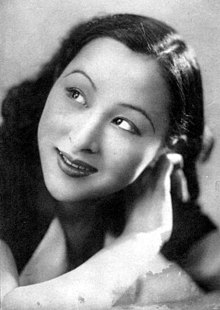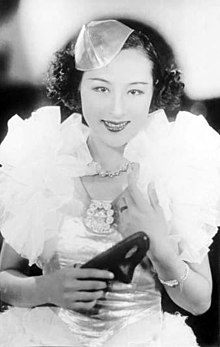| This article needs additional citations for verification. Please help improve this article by adding citations to reliable sources. Unsourced material may be challenged and removed. Find sources: "Yumeko Aizome" – news · newspapers · books · scholar · JSTOR (September 2020) (Learn how and when to remove this message) |
| Yumeko Aizome | |
|---|---|
 | |
| Born | Yachiyo Yokoyama (1915-12-25)December 25, 1915 Inawashiro, Fukushima, Empire of Japan |
| Occupations |
|
| Years active | 1930–1955, 1965 |
| Spouse |
Masanori Yusa (m. 1942–1975) |
| Children | 1 |
Yumeko Aizome (逢初 夢子, Aizome Yumeko, born December 25, 1915) is a Japanese former film and stage actress. She appeared in more than 115 film's, including silent and sound pictures, active in the Japanese cinema from her debut in 1932 until 1955 (and briefly one film in 1965).
Early life
Aizome was born as Yachiyo Yokoyama (横山 八千代, Yokoyama Yachiyo) in Inawashiro, Fukushima. Aizome's father died when she was 6 months old, and her mother died when she was 10 years old. After losing both parents, Aizome gave her possessions to her uncle and went to Tokyo with her older brother, where she went to elementary school.
Career
Aizome was born on Christmas Day 1915, in July 1930, she dropped out of high school to join the Shochiku Kagekidan musical theatre revue. Her first role was that of a pirate in a play titled merry-go-round. She appeared on stage until she made her screen debut
Her film debut was in Mikio Naruse's 1932 film Moth-eaten Spring, now considered lost. In early 1933, Aizome appeared in Yasujirō Ozu's Dragnet Girl. She then played Masumi, a prostitute and friend of the main character in Hiroshi Shimizu's Japanese Girls at the Harbor. In 1934 she appeared in her second and final Ozu film, A Mother Should Be Loved. That same year she starred alongside Yoshiko Okada in the leading role of Yasujirō Shimazu's film Our Neighbor, Miss Yae, playing the main character Yaeko. She appeared in many more movies throughout the 1930s and 1940s, including movies by Mikio Naruse, Hiroshi Shimizu and Heinosuke Gosho. In 1947, she played the sister of Setsuko Hara's character in A Ball at the Anjo House. In 1953, she had a minor role in Epitome. She retired from acting in 1955, but in 1965 made one more film appearance in Yoji Yamada's Kiri no Hata.
In 1985, Aizome was interviewed along with her Our Neighbor, Miss Yae co-star Sanae Takasugi. She was last heard from in 2002, when she provided source material for a book on Japanese modernist film.
Personal life
In 1942, Aizome married Masanori Yusa, a two-time olympic gold medalist freestyle swimmer. Her married name is Yachiyo Yusa (遊佐 八千代). Together the couple had a daughter, Makoto Yusa (born February 28, 1942), who became an actress under the name Naoko Yusa (遊佐 ナオ子).

Selected filmography
- Dragnet Girl (1933) - Misako
- Japanese Girls at the Harbor (1933) – Masumi
- A Mother Should Be Loved (1934) – Mitsuko
- Our Neighbor, Miss Yae (1934) – Yaeko
- A Ball at the Anjo House (1947) – Akiko Anjō
- Kiri no Hata (1965) – Yoshiko Ōtsuka
References
- Shimizu, Akira (1980). "Aizome Yumeko". Nihon eiga haiyū zenshū: Joyū hen. Tokyo: Kinema Junpo. pp. 4–5.
- 『日本映画スチール集 新興キネマ モダニズム篇』(立花忠男/編著、ワイズ出版、2002年1月) ISBN 4898301274 (in Japanese)
External links
- Yumeko Aizome at the Japanese Movie Database (in Japanese)
- Yumeko Aizome at IMDb
- Yumeko Aizome at rottentomatoes.com